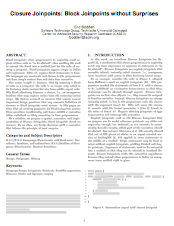Block joinpoints allow programmers to explicitly mark regions of base code as “to be advised”, thus avoiding the need to extract the block into a method just for the sake of creating a joinpoint. Block joinpoints appear simple to define and implement. After all, regular block statements in Java- like languages are constructs well-known to the programmer and have simple control-flow and data-flow semantics.
Our major insight is, however, that by exposing a block of code as a joinpoint, the code is no longer only called in its declaring static context but also from within aspect code. The block effectively becomes a closure, Read the rest of this entry »








